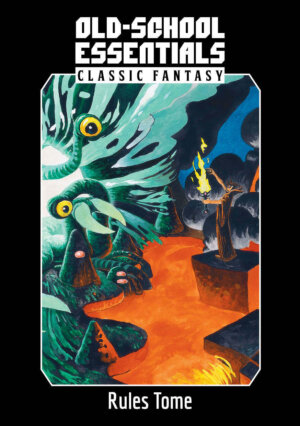
Publisher: Necrotic Gnome
Author: Gavin Norman
Artists: Stefan Poag, Mustafa Bekir, Michael Clarke, Thomas Denmark, Per Gradin, Pauliina Hannuniemi, Mike Hill, Jon Hodgson, Tom Kilian, Kyle Latino, Emma Lazauski, Jethro Lentle, Mark Lyons, Sam Mameli, Alex Mayo, Bradley McDevitt, Penny Melgarejo, Peter Mullen, Diogo Nogueira, Thomas Novosel, Juan Ochoa, Stefan Poag, Olivia Politz, Sean Poppe, Spaghetti Quester, Rachel Quinlan, Matthew Ray, Luka Rejec, Peter Saga, Audre Schutte, Johannes Stahl, Del Teigeler, Andrew Walter, Julee Wolke
Year: 2020 (V1.2)
Genre: A modern presentation of Basic and Expert boxed sets for Dungeons and Dragons
Pages: 296
MSRP: $40.00 for the A5 sized hardcover or $20.00 for the PDF at DriveThruRPG
Note: You can check out Jeff’s alternate take on the OSE Classic Fantasy Tome is his video review right here.
Old School Essentials (OSE) is a clone of the early 1980s Basic and Expert (B/X) Dungeons & Dragons sets. It uses original rules from those original sets and presents them in a single 6”x9” hard cover with smyth sewn binding, a new layout and original artwork. This is a stand alone rule book to be used by both players and dungeon masters. There is a five book set for classic fantasy, but they are simply the same rules distributed across five smaller books.
OSE is a relatively simple system that is fast and highly lethal. Games will tend to be lower fantasy as magic-users have few spells at low level. Quick character creation allows groups to quickly run an adventure. It follows many fantasy and legendary tropes of good versus evil with many monsters having a clear delineation between good (Lawful) and evil (chaotic). The gamemaster is expected to make judgment calls or even rules on the spot as this system does not have all encompassing rule set.
OSE recaptures the feel of the original sets with its retro style artwork. You will not find the lavish full color monster artwork seen by modern D&D books, but rather crude pencil drawings throughout with some full color artwork. This is definitely an area where people seeking the lush drawings found in newer roleplaying games may have issues with the style, but for nostalgic reasons I prefer this style of artwork where I would hate it in other systems.
Cleric and magic users have different spell lists. Clerics have a total of 42 spells over 5 levels and Magic Users have a total of 72 spells over 6 levels. There is some minor overlap of spells between the two classes with the full descriptions repeated where there is overlap. The book organizes the spells by level and class, so it is easy to reference what level a spell is and who can cast it.
Experience is primarily gained from treasure with less emphasis placed on defeating creatures. The system has numerous ways of draining players cash such as creating magic items, hiring retainers and henchmen, and building structures. The system assume characters will establish strongholds and will begin to attract followers once they reach 9th level. There are rules for the cost of structures and hiring non-player characters. Spellcasters will have money sinks by learning new spells. An interesting dynamic of the game is how players will carry the treasure out as coins are fairly heavy after an adventure.
The adventuring section has rules for dungeon, wilderness and waterborne movement. There are rules for encumbrance, random encounters, morale, and hazards. There are numerous wilderness tables based on the type of terrain. The gamemaster section is very brief and for those looking for expansive details on how to run a game I would suggest other products.
The monster section has about 200 monsters with each monster having a very brief description and a couple of lines of statistics. Typically three monsters are presented per page. Those groups familiar with 5e will see much
There are nearly 50 pages devoted to treasures which include tables for hordes, magic items, gems and jewelry. Swords can be sentient and even take over a character. No other weapons have such abilities.
The book ends explaining how certain ambiguities and conflicts about the rules were addressed. The original expert and basic rules conflicted or omitted rules and costs, which this book has fixed. Overall, it is welcome to see an explanation about rules decisions were made.
A few rules still bug me even forty years after I first started playing. Permanent level loss by undead. Characters will be moving 6 to 12 feet a minute in unexplored areas and the fact coins weight are 10 to 20 times more than historical coins. Certain classes can not use certain weapons or armor (a magic user cannot pick up a sword to use for combat). Overall, these are minor nitpicks than can modified or adjusted by the dungeon master.
Finally, no review can be complete without some comparison between the current 5th edition D&D to the classic (B/X) rules. The feel is starkly different with B/X combat rules being absolutely brutal compared to 5th edition. Death at zero hit points, magic-users are limited in weapons and armor, spells are in short supply, and healing is a fraction of the speed. Morale and reaction tables are much more critical as players will likely try to talk their way out of combat or at least cause monsters to flee. Character selection is limited and at higher levels demihumans will be behind their human counterparts. Thieves will be a few levels ahead of their equivalent magic-user or elf in the party. Retainers and hirelings will be critical for player survival.
Overall, I recommend OSE for people looking for a grittier and simpler Dungeons & Dragons game, but there are some major pitfalls for players who want to play a high fantasy game where death is much less common.